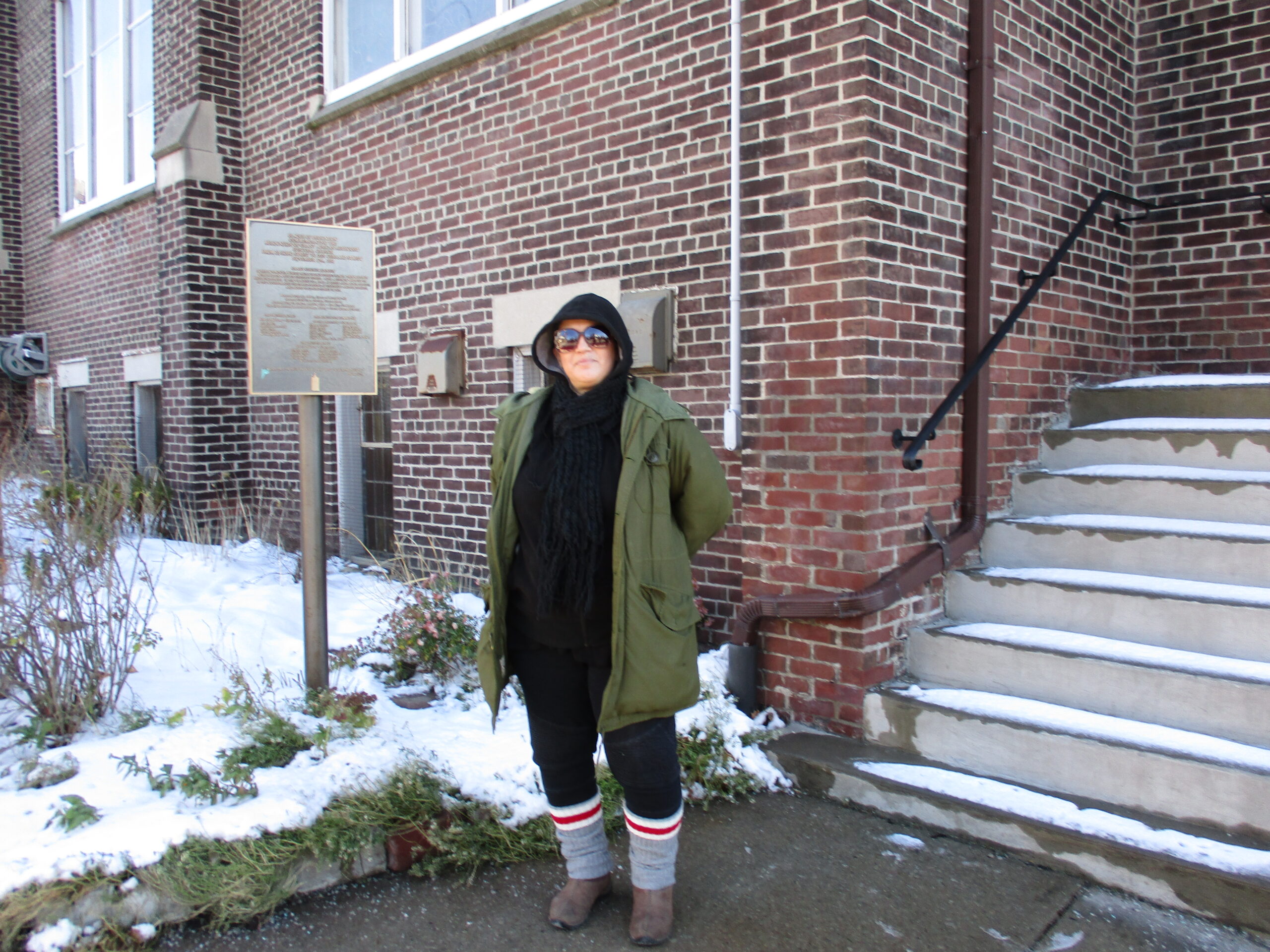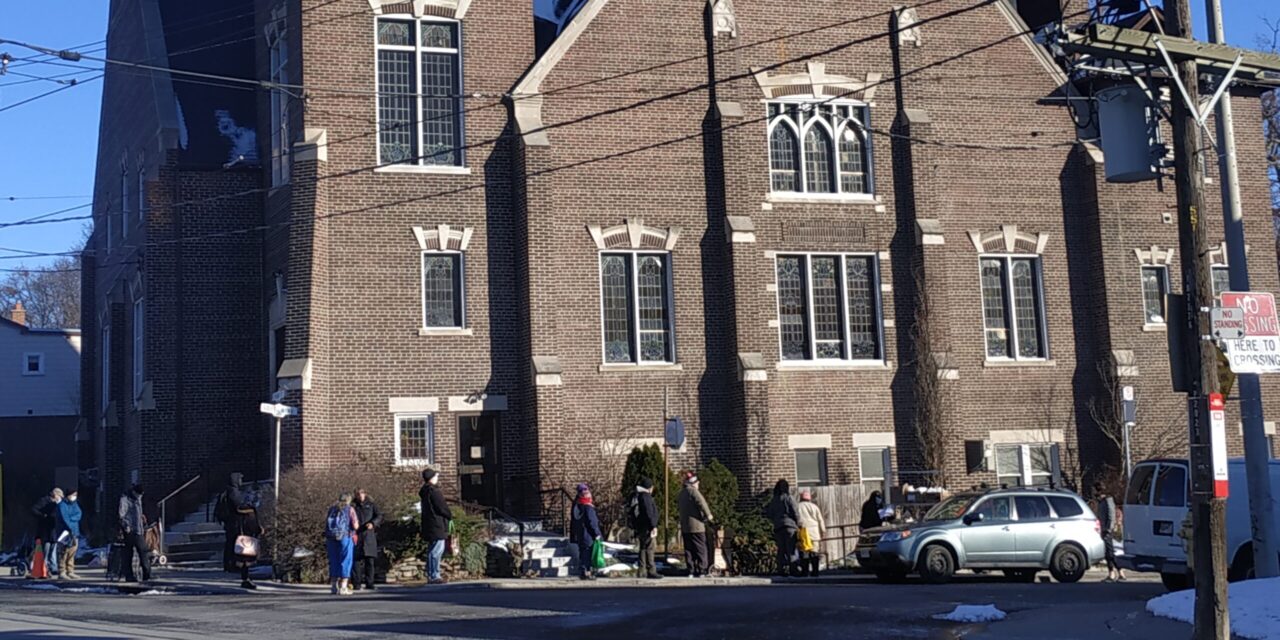Clients in a queue before entering the Grant AME Church’s food bank to collect food hampers prepared by volunteers. (Photo taken by Tamanna Khan)
TORONTO – Wednesdays are long and busy for Denise DiCicco.
The 46-year-old has been volunteering for three years at the Grant African Methodist Episcopal Church’s food bank in Toronto. Before the pandemic, food trucks from the Daily Bread Food Bank would deliver necessities midweek for distribution on Fridays. But COVID-19 has changed the way this food bank works. DiCicco said people no longer feel comfortable coming out twice a week. So all the hard work falls on one day. Wednesdays.
DiCicco estimates that the number of food bank users has tripled, and volunteers now pack and distribute 200-250 food boxes all in one day. Through the day, as many as 20 volunteers prepare and give out the boxes.
DiCicco often stays from morning to evening. It is sometimes so busy that she hardly has time to eat.
“Before it was just like low-income people coming to use food banks. Now we see all types of people coming in,” DiCicco said.
Food banks in Toronto saw a jump from about 100,000 average monthly visits between May and June to over 120,000 visits between July and August according to a recent report by Daily Bread and North York Harvest food banks. Compared to late summer last year visits have doubled.
Feed Ontario, in a report published last week, highlighted that Ontario’s food banks saw a 26 per cent increase in first-time visitors between March and June.
According to Food Banks Canada, demand may be rising, but they are reporting fewer volunteers showing up to connect users to the food they need. The decline is partly because many volunteers are senior citizens and are at higher risk from COVID-19, a Food Banks Canada spokesperson said in an email.
Henry Chiu, director of development and marketing for North York Harvest, said half of their 40 network agencies had to close immediately after March 16 for two reasons. “They were either located in a public location, so they had to be closed, or they were operated simply by volunteers,” he said.
The organization cancelled all on-site volunteer activities to limit contact, said Chiu, adding that their main locations are now run by staff.
Before the pandemic, volunteers would help North York Harvest sort the food four days a week. Without them, processing donated food has become slower, said Chiu.

Denise DiCicco sorting and packing eggs inside the Grant AME Church. (Photo provided by Denise DiCicco)
The organization now has to serve more people with fewer open locations, fewer helping hands and reduced hours of operations.
“Before it was just like low-income people coming to use food banks. Now we see all types of people coming in.”
– Denise DiCicco
Chiu said they also face issues with storage space.
They received shipping containers as donations to store non-perishable items in food banks operating from places like parking lots.
They also need to keep their staff and the clients warm during winter. Chiu said they are in the process of buying warm clothes and heaters.
Feed Scarborough, also called Scarborough Food Security Initiative, started in March. It counted on 180 volunteers to deliver food hampers to 1,000 households in the Scarborough area each week. But during the third phase of reopening in Toronto in late July, they had fewer volunteers turn up. Suman Roy, the non-profit organization’s chair, had to stop their delivery.
“We realized because we were losing our volunteers to going back to work, we could not do the delivery to 1,000 households every week,” Roy said.
The organization looked for space and within a short time were able to open four food banks in the area. Roy also implemented a grocery system model developed by Daily Bread to run three of their food banks. Instead of lining up for packaged hampers, clients make appointments to come in. They pick up what they need from inside the food bank using a pre-loaded points card. The points are based on the number of people in a household. Unused points can be carried forward.
“Food is a human right in this country. And who am I to tell another person what they should eat or what they should feed their family?” he said.
Meanwhile, to cope with cold weather, Grant African Methodist Episcopal Church has started serving food bank visitors indoors since Dec. 2. DiCicco said they are letting three clients in at a time She said they also placed a heating lamp outside to keep the clients in the queue warm.
DiCicco, who lives alone, said she is not worried about contracting the virus because she takes necessary precautions. Her concern is that misconceptions about food banks sometimes stop financially struggling families from using them.
“People have this misconception that food banks are only for people on welfare,” said DiCicco, who is on the Ontario Disability Support Program and a food bank client.
She said she advises people who are struggling to make ends meet to use food banks.
“We had a woman who has been donating to us regularly,” DiCicco said. “Last month, she messaged me and the first thing that she said was ‘I’m so embarrassed to say this, but how would I be able to use the food bank?’”
DiCicco said it made her realize how people are struggling during the lockdown.
“Just because someone owns a house and has a car, that doesn’t mean that they’re not struggling.”

Denise DiCicco taking a short break in front of the Grant AME Church. (Photo taken by Tamanna Khan)





